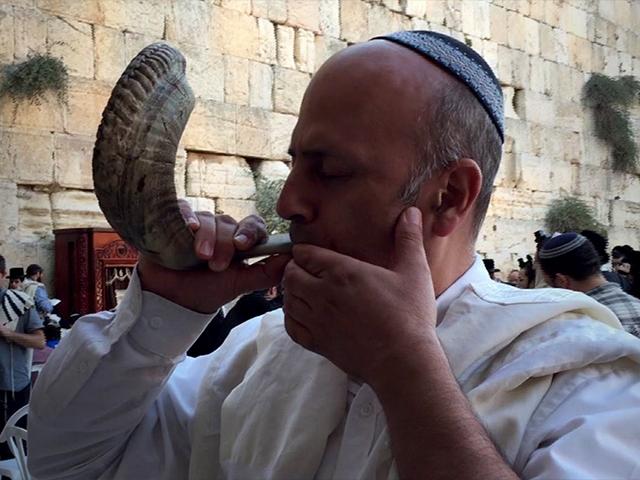The Use of the Shofar

To those who haven't heard it, the blast of the shofar is hard to describe in terms other than primitive, harsh, a bellowing or trumpeting, and it awakens in the hearer a primitive awareness of a reality beyond himself. It speaks with a commanding, demanding sound. Not a note to comfort, it creates an uneasiness, an attention in the depths of being. In a day long past, when communication was limited to what was heard face-to-face, the sound of the shofar was the call to arms, the alarm for any disaster, the signal to assemble for community business, the solemn announcement of an excommunication. It calls up the remembrance of Sinai when the sound issued from a thick cloud and the people trembled. The shofar accompanied the solemn, seven-day procession of the sacred Ark around Jericho as the terror-stricken inhabitants saw their city walls crumble to dust in the echo of its blast. And such a sound will announce the time of the Great Day of the Lord.
The use of the shofar is now reserved for sacred occasions. Only the horns of animals fit for sacrifice are used. It was and still is usually made from the horn of a wild goat or ram, cleaned by boiling, softened by heat and oil until it is possible to shape into a straight or curved form. The mouthpiece must be formed from the tip of the horn, but precious metal might ornament it: gold for Rosh Hashanah; silver for fast days. It's much polished, scraped thin to lighten it, and occasionally inscribed with geometric designs or scripture.
Characteristically, the shofar is associated with Rosh Hashanah, the first of Tishri, the beginning of the year, a time spoken of in Leviticus 23:24 as a "memorial of blowing." Its use is extended by custom through the preceding month Elul when it concludes the Morning Service. It's also heard at the conclusion of Yom Kippur and is authorized for use on other festivals and fasts.
To hear the sound at Rosh Hashanah is counted as a commandment and the second blessing is a thanksgiving for causing the hearer to reach the time when the commandment can be fulfilled. The sound is intended to awaken the hearer to teshuvah (repentance), and to lead him to make peace with his fellow man and with God. The basic mitzvah of hearing nine sounds (arrived at by interpretation from Leviticus 25:9) is expanded by custom into 100, the order of them within the service being defined by local usage.
The musical interval indicated as proper for sounding the shofar is a fifth, and the instrument is unable to produce more than three or four varied tones. The rhythm of the prescribed sound varies from the simple blast called tekiah to the staccato teruah, the galloping shevarim, to the long, wailing tekiah gadolah.
What does the shofar say to us, beyond its use to fulfill commandment, ritual and custom? Like the shofar, we are hollow, empty of meaning until filled by the breath of God. Like the shofar, we speak with no real voice until more than created, we are re-created from outside ourselves, born from above. By God's Spirit in us we become His voice. Alive with His Word, we can sound forth the call to repentance. His Spirit, resident in us, speaks faithfully both to those who will hear and those who do not want to hear, calling us to consider what and who we are before God. The sound of the shofar is not the Word of the Lord, but who can hear and not listen for the Word to speak from within?
Learn more about Christianity's Jewish roots at the Jews for Jesus Web site
© Jews for Jesus. All rights reserved. Used with permission.





